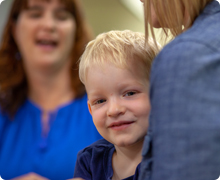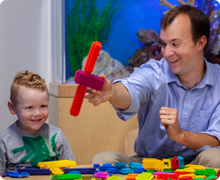Early Childhood Clinic
What is the Early Childhood Clinic?
 The Early Childhood Clinic is a specialty clinic within Psychiatry and Behavioral Medicine for babies and children age 4 or younger who have:
The Early Childhood Clinic is a specialty clinic within Psychiatry and Behavioral Medicine for babies and children age 4 or younger who have:
- Behavior issues, like disruptive behavior
- Anxiety
- Sleep problems
- Neurodevelopmental problems
- Exposure to alcohol or drugs before birth (prenatal)
Many of our patients have behavior challenges along with a medical concern. Sometimes, their behavior and their other condition affect each other, making their care more complex.
We do a thorough evaluation to understand your child’s challenges and then work closely with you to provide short-term, evidence-based care. Our focus is on helping you as a parent with training, support and other resources so you can help your child.
We do not treat these conditions
- Sexual abuse or sexual aggression. Call the King County Sexual Assault Center at 888-998-6423 or Harborview Abuse and Trauma Center at 206-744-1600.
How will the Early Childhood Clinic meet my needs?
Early Childhood Clinic providers are experts in the emotions and behavior of babies and young children. We know the treatment methods that work best for their age and developmental stage.
-
Initial telemedicine visit to match you with services
To learn more about your child, we begin with a telehealth (virtual) consultation. A clinic provider will meet with you online to hear your concerns and ask questions. At the end of the visit, we will talk with you about next steps and recommendations. We may suggest services for your child either at Seattle Children’s or in the community.
-
Thorough evaluation in person to understand your whole child
After your telemedicine visit, your child’s provider may recommend coming to Seattle Children’s for a more in-depth evaluation. To get a complete picture, we ask you to fill out a family information form online before your first appointment. During your evaluation visits, we also:
- Talk with you to learn more about your child.
- Ask you to fill out forms that ask questions about your child.
- Observe your child’s behavior, like how they interact or play with you.
- Look for signs of developmental concerns. We may do tests too.
Our goal is to understand your child’s struggles and possible solutions. Usually, evaluations take 3 to 4 visits. Then we make a diagnosis and develop a treatment plan.
-
Feedback session to share results and recommendations
We explain what we found and what we recommend as a next step. We also ask for your input about the diagnosis and treatment plan.
-
Evidence-based care tailored to your family
For young children, we focus on teaching you, the parent, the information and skills to help your child thrive and succeed. We offer training, coaching, support and resources for you, matched to your child’s behavior and development. (We do not offer play therapy or other forms of 1-on-1 therapy for children age 4 or younger.)
Based on your child’s needs, treatment may involve many options. These are some examples:
- Parent groups at Seattle Children’s where you can gain skills to help your child and get support from other parents (Incredible Years group and Anxiety Parent Group)
- Training on the most effective ways to handle your child’s behavior with the Early Childhood Clinic team
- Reading materials that address your child’s needs
- Prescribing medicine for your child’s condition (less common for young children) or adjusting your child’s current medicine
- Referral to a behavior specialist to assess why your child acts a certain way and how to change their behavior
- Referrals to other programs at Seattle Children’s, like the Autism Center or Sleep Disorders Program
- Referral for a birth-to-3 center or special education assessment
- Referrals to other community resources
-
Working as a team with other Seattle Children’s providers
Our team works with providers from other specialties at Seattle Children’s to address all aspects of your child’s health, including:
Seattle Children’s also offers a mental health clinic for children age 2 to 18 and their families who prefer to get some or all of their care in Spanish. Learn more.
We do not offer these services
- Long-term individual therapy or long-term medicine management.
- In-home therapy. Many community mental health centers provide this service.
- Parenting evaluations for legal purposes, such as developing parenting plans. Visit the Parenting Evaluation Treatment Program (PETP) Graduates webpage for a list of trained providers in the community.
- School evaluations after suspension or expulsion. Contact your child’s school for a list of providers who do “return to school” evaluations.
Scheduling an Appointment With the Early Childhood Clinic
- If you would like a referral to the Early Childhood Clinic, talk to your primary care provider.
- How to schedule an appointment at Seattle Children’s.
- If you already have an appointment, learn more about how to prepare.
- Learn about Psychiatry and Behavioral Medicine resources such as useful links, videos and recommended reading for you and your family.
Who’s on the team?
 The Early Childhood Clinic team includes psychiatrists, psychologists and mental health therapists. They work together closely to understand your child’s needs and develop a complete treatment plan. Dr. Brent Collett, leads the team.
The Early Childhood Clinic team includes psychiatrists, psychologists and mental health therapists. They work together closely to understand your child’s needs and develop a complete treatment plan. Dr. Brent Collett, leads the team.
How to Get Services
Often, there are more patients who need our services than we have capacity. To make an appointment with the Early Childhood Clinic, you need a referral from your child’s primary care provider. Once we get a referral from your provider, we will let them know if we have an opening for your child or not.
- Learn more about how to get mental health services at Seattle Children’s.
- For more information, contact the Early Childhood Clinic at 206-987-2164.
Providers, see how to refer a patient.
Telemedicine at Seattle Children’s
You may be offered a telehealth (virtual) appointment. Learn more.
Have insurance questions?
Some insurance plans have Seattle Children’s as an in-network provider for medical services and an out-of-network provider for mental health services.
Even if your plan offers an out-of-network benefit, we are not accepting new patients for our mental health services if their insurance does not include Seattle Children’s as an in-network provider.
Learn about mental health insurance coverage at Seattle Children’s.
Paying for Care
Learn about paying for care at Seattle Children’s, including insurance coverage, billing and financial assistance.
In crisis?
If you, your child, family or friend needs help right away, call or text 988. Chat is another option. The 988 Suicide & Crisis Lifeline provides free and confidential support for people in distress, as well as prevention and crisis resources. The Lifeline is available 24 hours a day, 7 days a week in the United States.
Hotlines for Youth (PDF) provides other options for immediate help for children and teens. (Also available in Amharic, Arabic, Russian, Simplified Chinese, Somali, Spanish, Ukrainian and Vietnamese.)